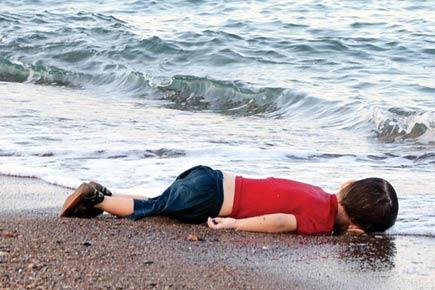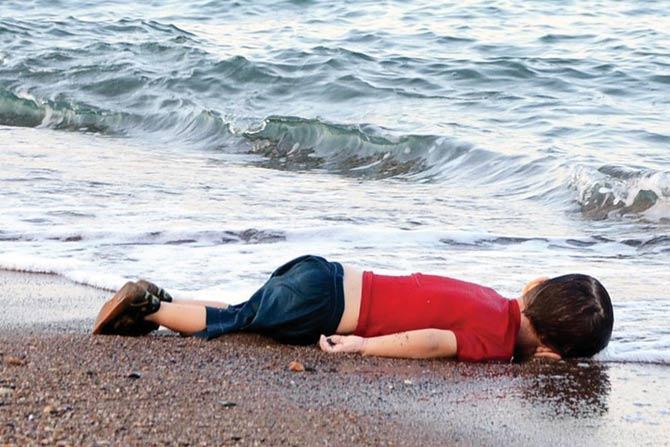Last week the picture of a dead Syrian child on a beach shocked the world. In his gruesome death, 3-year-old Aylan Kurdi has become somewhat of an Internet sensation.

The image of a three-year-oldu00c3u0083u00c2u00a2u00c3u0082u00c2u0080u00c3u0082u00c2u0099s body, which had washed ashore in Bodrum, southern Turkey, on September 2, brought the refugee crisis to the notice of the world.
 Last week the picture of a dead Syrian child on a beach shocked the world. In his gruesome death, 3-year-old Aylan Kurdi has become somewhat of an Internet sensation. The toddler, his face dug into the sand, as if sleeping in his bed, has jolted the world into the cruelties of war and the hard heartedness of countries that wont open their door to refugees from failed nations.
Last week the picture of a dead Syrian child on a beach shocked the world. In his gruesome death, 3-year-old Aylan Kurdi has become somewhat of an Internet sensation. The toddler, his face dug into the sand, as if sleeping in his bed, has jolted the world into the cruelties of war and the hard heartedness of countries that wont open their door to refugees from failed nations.
Wars are gruesome and if you are following the Syrian refugee crisis you will know to what extent the world is grappling with, millions who are risking their lives fleeing to countries near and far, begging to be let in.
ADVERTISEMENT

The image of a three-year-old’s body, which had washed ashore in Bodrum, southern Turkey, on September 2, brought the refugee crisis to the notice of the world. Pic/AFP
Amidst this humanitarian crisis, India and Pakistan are ‘celebrating’ the 50th anniversary of the 1965 war: One with a carnival and talk of short war, the other with chest-thumping talk of launching a nuclear strike. Both claim victory in the war of 1965. How does one remember a war? In my view, it is an occasion to commemorate the defence of one’s country from invaders, remembering the perfidy of our enemy, thanksgiving for soldiers who gave up their lives defending our borders, and those civilians who also played their part in strategizing and ending the war, standing resolute in our pledge that every inch of territory will be guarded and not compromised with.
Pakistan celebrated the 50th anniversary of Yaum-i Difa or Defense of Pakistan day on Sunday, September 6th to mark what it calls the historic defence against the might of the Indian army’s ‘offence’ in 1965. That is how they write history in Pakistan. Leaving aside a few, dwindling brave columnists and historians who dare to speak out on the foibles of generals past and present, there is little hope when the country willfully jumps into mass delusion. Military historians around the world have documented that Operation Gibraltar and Operation Grand Slam launched by Pakistan in 1965 were military disasters.
Operation Gibraltar was the brainchild of Zulfikar Ali Bhutto to infiltrate Jammu and Kashmir, defeat the Indian army and annex the entire state. Operation Grand Slam was also a Pakistani military operation to attack the Akhnoor sector by cutting off logistical link for the Indian army. India fresh from the humiliating defeat at the hands of the Chinese army in 1962 had no stomach for another loss. It gave back as good as it got if not better. The valour and courage on the field was supplemented by grit and determination of the diminutive Prime Minister. Lal Bahadur Shastri was certain that we would not give up an inch of territory.
In the war and finally the declaration of peace on 23rd September, sealed in Tashkent in January 1966, another bloody chapter in India-Pakistan relations was written. It wasn’t the complete end of hostilities. We fought a war in 1971 and another in 1999, besides an undeclared asymmetrical war for decades in Jammu and Kashmir.
The Line of Control is active once again with cross fire claiming the lives of soldiers and civilians. There is again bizarre war talk going on among jingoists on both sides of the border. Reacting to an academic observation by the Indian army chief that countries need to have “very high levels of operational preparedness at all times” because “swift, short nature of future wars is likely to offer limited warning time,” jihadists and politicians in Pakistan went ballistic. They saw in this a warning that Indian was planning to put into action what they thought was always its intention: A Cold Start doctrine of multiple offensives.
Former Pakistani Army Chief Gen. Mirza Aslam Beg is quoted in an Urdu daily Ummat threatening that if India triggered a war the war would be fought on Indian soil. He also boasted that India did not have the stomach to fight beyond 15 days but the Afghan-jehad experienced Pak Army could fight on for months. Beg also alleged that Indian external agencies had already launched a parallel war on Pakistan via its coastal areas by smuggling fake currency, alcohol, weapons and gold and supplying it to Pakistani separatists.
Pakistani TV shows are now replete with military and civilian experts comparing missile to missile, nuclear piles and fighter jets.
This then is the irony of this September fifty years after that September war: that instead of introspecting and pledging never to repeat that period, the two nations are yet to decide what is a better option – war or peace. The image of the dead toddler on a cold European beach should not make the choice that difficult.
Smita Prakash is Editor, News at Asian News International. You can follow her on Twitter @smitaprakash
 Subscribe today by clicking the link and stay updated with the latest news!" Click here!
Subscribe today by clicking the link and stay updated with the latest news!" Click here!







